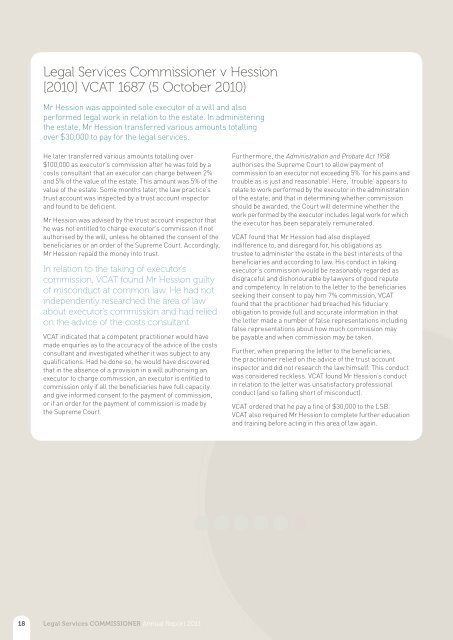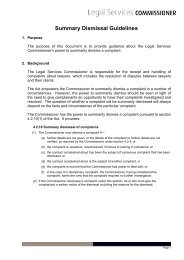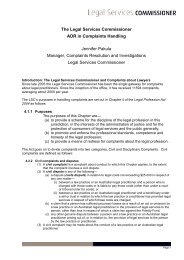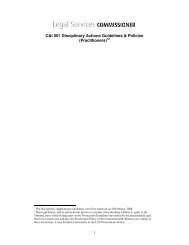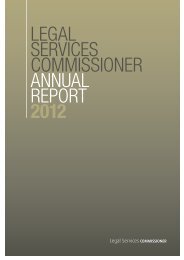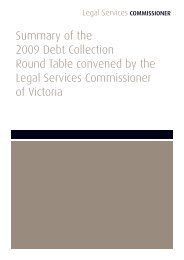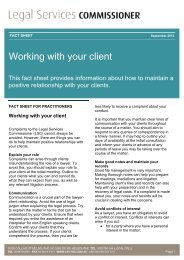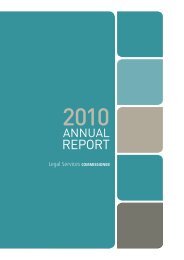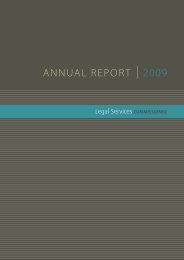Annual Report 2011 - Legal Services Commissioner
Annual Report 2011 - Legal Services Commissioner
Annual Report 2011 - Legal Services Commissioner
You also want an ePaper? Increase the reach of your titles
YUMPU automatically turns print PDFs into web optimized ePapers that Google loves.
<strong>Legal</strong> <strong>Services</strong> <strong>Commissioner</strong> v Hession<br />
[2010] VCAT 1687 (5 October 2010)<br />
Mr Hession was appointed sole executor of a will and also<br />
performed legal work in relation to the estate. In administering<br />
the estate, Mr Hession transferred various amounts totalling<br />
over $30,000 to pay for the legal services.<br />
He later transferred various amounts totalling over<br />
$100,000 as executor’s commission after he was told by a<br />
costs consultant that an executor can charge between 2%<br />
and 5% of the value of the estate. This amount was 5% of the<br />
value of the estate. Some months later, the law practice’s<br />
trust account was inspected by a trust account inspector<br />
and found to be deficient.<br />
Mr Hession was advised by the trust account inspector that<br />
he was not entitled to charge executor’s commission if not<br />
authorised by the will, unless he obtained the consent of the<br />
beneficiaries or an order of the Supreme Court. Accordingly,<br />
Mr Hession repaid the money into trust.<br />
In relation to the taking of executor’s<br />
commission, VCAT found Mr Hession guilty<br />
of misconduct at common law. He had not<br />
independently researched the area of law<br />
about executor’s commission and had relied<br />
on the advice of the costs consultant.<br />
VCAT indicated that a competent practitioner would have<br />
made enquiries as to the accuracy of the advice of the costs<br />
consultant and investigated whether it was subject to any<br />
qualifications. Had he done so, he would have discovered<br />
that in the absence of a provision in a will authorising an<br />
executor to charge commission, an executor is entitled to<br />
commission only if all the beneficiaries have full capacity<br />
and give informed consent to the payment of commission,<br />
or if an order for the payment of commission is made by<br />
the Supreme Court.<br />
Furthermore, the Administration and Probate Act 1958<br />
authorises the Supreme Court to allow payment of<br />
commission to an executor not exceeding 5% ‘for his pains and<br />
trouble as is just and reasonable’. Here, ‘trouble’ appears to<br />
relate to work performed by the executor in the administration<br />
of the estate; and that in determining whether commission<br />
should be awarded, the Court will determine whether the<br />
work performed by the executor includes legal work for which<br />
the executor has been separately remunerated.<br />
VCAT found that Mr Hession had also displayed<br />
indifference to, and disregard for, his obligations as<br />
trustee to administer the estate in the best interests of the<br />
beneficiaries and according to law. His conduct in taking<br />
executor’s commission would be reasonably regarded as<br />
disgraceful and dishonourable by lawyers of good repute<br />
and competency. In relation to the letter to the beneficiaries<br />
seeking their consent to pay him 7% commission, VCAT<br />
found that the practitioner had breached his fiduciary<br />
obligation to provide full and accurate information in that<br />
the letter made a number of false representations including<br />
false representations about how much commission may<br />
be payable and when commission may be taken.<br />
Further, when preparing the letter to the beneficiaries,<br />
the practitioner relied on the advice of the trust account<br />
inspector and did not research the law himself. This conduct<br />
was considered reckless. VCAT found Mr Hession’s conduct<br />
in relation to the letter was unsatisfactory professional<br />
conduct (and so falling short of misconduct).<br />
VCAT ordered that he pay a fine of $30,000 to the LSB.<br />
VCAT also required Mr Hession to complete further education<br />
and training before acting in this area of law again.<br />
18 <strong>Legal</strong> <strong>Services</strong> COMMISSIONER <strong>Annual</strong> <strong>Report</strong> <strong>2011</strong>


